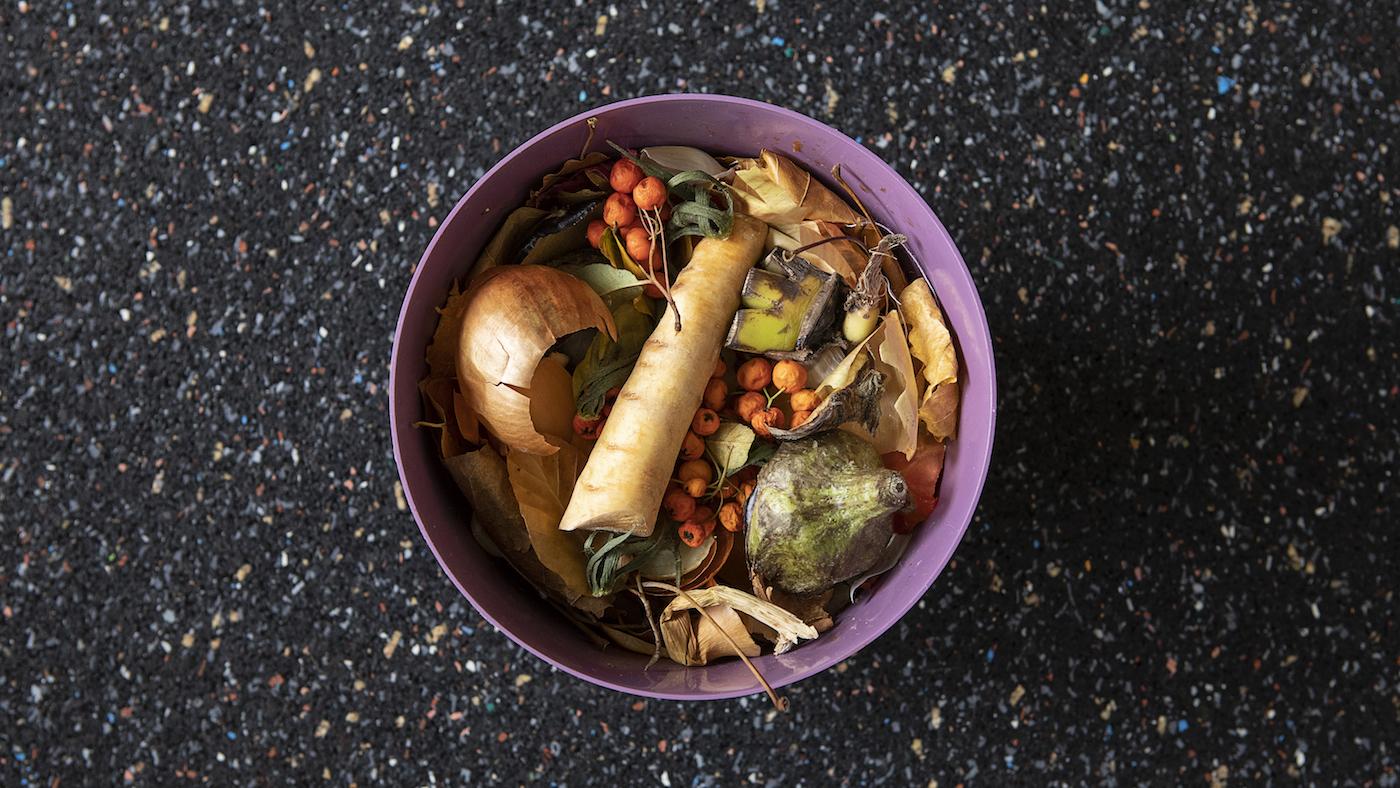The Widespread Benefits of Composting
Daniel Hautzinger
April 22, 2021

An estimated 17% of the food produced globally each year—1.03 billion tons—is wasted, according to a recent UN report. When all that organic waste ends up in an oxygen-starved landfill to decompose, it releases methane, a greenhouse gas that warms the planet at a much greater rate than carbon dioxide. Emissions from landfills in the United States are the greatest of any country on Earth, equivalent to 37 million cars every year.
Instead of contributing to global warming, that food waste could be turned to the benefit of the planet via composting. (Leaving aside the issue of so much food being wasted in the first place, a whole different problem.) Rather than generating methane, organic waste that is composted can enrich soil and increase carbon capture.
“It’s such a lose-lose-lose if you put the food in the landfill,” says Erlene Howard, the founder and owner of the Evanston-based compost pickup service Collective Resource. “The wins of composting are better soil quality, non-chemical farming, no methane production, having the material break down naturally, reducing landfill use. There isn’t anything bad about composting.”
Perhaps surprisingly, the majority of wasted food comes from households, at 61%, versus 26% from food service and 13% from retailers, according to the UN report. Services like Collective Resource allow people to compost their food waste instead of throwing it in the trash—even if they live in an apartment and don’t have the room to compost on their own.
Howard, a condo-dweller who began using a friend’s backyard compost heap years ago, had a “light bulb moment” when she realized, “if this was easy, more people would do it.” So she started Collective Resource, doing her first compost collection in 2010. (You can see the company in its early stages in a 2012 WTTW News story.) As far as she knows, it was the first residential compost service in Chicago. Other companies have now joined her: Urban Canopy, Healthy Soil Compost, and WasteNot Compost offer compost pickup, while the city stalwart the Resource Center and Block Bins have community composting bins available. (Collective Resource and other companies also collect from restaurants and businesses.)
All of these services use commercial composting, which has a significant advantage over a basic backyard composting operation or vermiculture, which uses worms to break down food scraps. “There are limited things that the worms can eat, that you can put in your backyard compost,” explains Howard. “But with commercial composting, because the piles are so hot, you can compost everything that was once alive. It takes a real master gardener to get a compost pile to cook, and you need to have it hot to process meat, to break down the pathogens, and to deal with moldy dairy.”
Still, Illinois and Chicago have a dismal waste-diversion record. Only 1.5% of food scraps, or 36,499 tons, were composted in Illinois in 2018, according to the Illinois Food Scrap Coalition. Just over 70 municipalities in the state offer curbside commercial composting.
Chicago is not one of them, even though more than 20% of material sent to the landfill by weight is food waste, and a University of Illinois at Chicago report found that a decentralized composting program could divert up to 25% of the city’s food waste.
The city is even worse when it comes to recycling: a 2018 Better Government Association report found that Chicago’s recycling rate was the worst of any big city in the United States, at 9%. But the recent announcement that Lakeshore Recycling Systems would be taking over residential recycling from Waste Management in four out of six of the city’s recycling regions does have advocates hopeful that positive change is coming.
Waste diversion rates can improve, and drastically, as can be seen by progress in other places. San Francisco launched a mandatory organics recycling program in 2009, and now diverts 80% of its food waste. South Korea went from recycling almost no food waste to recycling 95% of it in the past 25 years.
As The New Yorker detailed, South Korea’s success came in part from replacing a flat tax for waste disposal with a fee for trash, calculated by size and number of bags; recycling is free. It is illegal to send food waste to landfills in South Korea, and automated bins and biodegradable bags make depositing food waste simple. Food waste per person has decreased by three quarters of a pound a day. The economic benefit is estimated by the country to be in the billions of dollars over the years.
Howard contends that Illinois and Chicagoland need more infrastructure, especially more composting sites, to expand composting, pointing to a defeated plan to add a site near Glenview. She also says that, “For the most part, the businesses, especially the large producers, are not going to compost until they’re told they have to, because it’s so cheap to landfill in Illinois. It’s not apples to apples. There’s more work that has to go into composting; it doesn’t just get stuffed into a dangerous landfill until it’s leaking and causing problems. I don’t think that people look at the long-term cost of not composting.”
A panel of waste diversion experts convened by WBEZ offered its own recommendations, including setting clear waste diversion goals in the city and instituting better education. For instance, Evanston, which partners with Collective Resource to provide composting, has set benchmarks to become zero-waste.
“Initially people just kind of thought I was nuts,” Howard says, laughing, of beginning her business. “But people are different now, and there are all these other [residential compost pickup services] now, and I’ve been very supportive of all of them along the way. There’s way too much work for me to do alone.”







